-
 Bitcoin
Bitcoin $84,886.7615
-0.14% -
 Ethereum
Ethereum $1,581.5270
-2.65% -
 Tether USDt
Tether USDt $0.9999
0.01% -
 XRP
XRP $2.0882
-2.39% -
 BNB
BNB $582.3082
-0.40% -
 Solana
Solana $127.5462
-1.96% -
 USDC
USDC $1.0000
0.01% -
 TRON
TRON $0.2533
1.94% -
 Dogecoin
Dogecoin $0.1543
-1.49% -
 Cardano
Cardano $0.6062
-2.88% -
 UNUS SED LEO
UNUS SED LEO $9.4099
0.75% -
 Chainlink
Chainlink $12.2075
-1.60% -
 Avalanche
Avalanche $18.9156
-3.41% -
 Stellar
Stellar $0.2350
-1.64% -
 Toncoin
Toncoin $2.8614
-3.37% -
 Shiba Inu
Shiba Inu $0.0...01173
-1.51% -
 Sui
Sui $2.0690
-4.30% -
 Hedera
Hedera $0.1578
-3.19% -
 Bitcoin Cash
Bitcoin Cash $321.2468
-0.91% -
 Litecoin
Litecoin $74.3968
-1.35% -
 Polkadot
Polkadot $3.5397
-1.95% -
 Dai
Dai $0.9999
0.00% -
 Hyperliquid
Hyperliquid $15.7161
0.35% -
 Bitget Token
Bitget Token $4.3529
1.08% -
 Ethena USDe
Ethena USDe $0.9992
0.00% -
 Pi
Pi $0.6075
-7.67% -
 Monero
Monero $217.5058
0.99% -
 Uniswap
Uniswap $5.1384
-3.22% -
 OKB
OKB $51.5691
-0.09% -
 Pepe
Pepe $0.0...07083
-1.23%
What is Greenfield storage for blockchain?
Greenfield storage uses blockchain for decentralized, secure data storage, distributing data across nodes to enhance security and scalability in cryptocurrency applications.
Apr 15, 2025 at 11:07 am
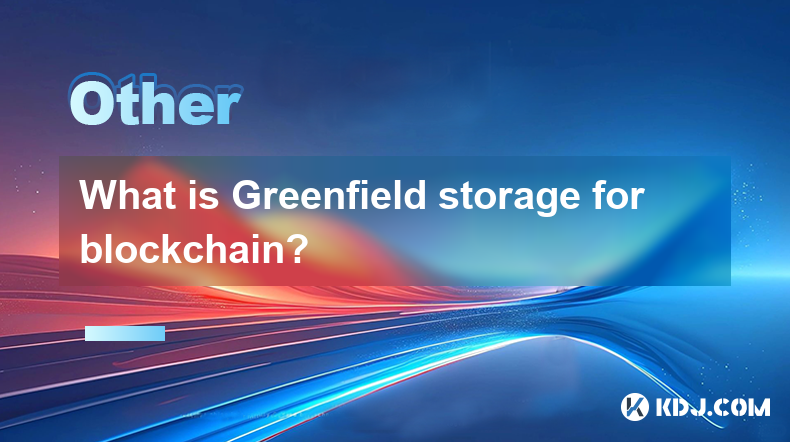
Greenfield storage for blockchain refers to a decentralized storage solution that leverages blockchain technology to provide secure, scalable, and efficient data storage. Unlike traditional centralized storage systems, Greenfield storage operates on a peer-to-peer network, ensuring that data is distributed across multiple nodes, enhancing security and reducing the risk of data loss or manipulation. This innovative approach to data storage is particularly appealing in the cryptocurrency circle, where data integrity and security are paramount.
The Concept of Greenfield Storage
Greenfield storage is built on the principle of decentralization, which is a core tenet of blockchain technology. In a Greenfield storage system, data is broken down into smaller pieces and distributed across a network of nodes. Each node in the network holds a portion of the data, and the entire dataset can be reconstructed by combining these pieces. This method not only enhances data security but also improves the efficiency of data retrieval and storage.
Benefits of Greenfield Storage in Blockchain
One of the primary benefits of Greenfield storage in the blockchain ecosystem is enhanced security. Since data is distributed across multiple nodes, it becomes extremely difficult for malicious actors to compromise the entire dataset. Additionally, Greenfield storage offers improved scalability, as the network can easily accommodate more data by adding more nodes. This scalability is crucial for blockchain applications that require large amounts of data storage, such as decentralized finance (DeFi) platforms and non-fungible token (NFT) marketplaces.
How Greenfield Storage Works
To understand how Greenfield storage works, it's essential to delve into its operational mechanics. When a user wants to store data on a Greenfield storage network, the data is first encrypted and then split into smaller chunks. These chunks are then distributed across the network of nodes. Each node stores a piece of the data and maintains a record of its location on the blockchain. When a user wants to retrieve the data, the system locates the relevant chunks and reconstructs the original data.
Implementing Greenfield Storage: A Step-by-Step Guide
For those interested in implementing Greenfield storage for their blockchain projects, here is a detailed guide on how to set it up:
- Choose a Greenfield Storage Platform: There are several platforms available that offer Greenfield storage solutions, such as Filecoin, Storj, and Sia. Research these platforms to determine which one best suits your needs.
- Set Up a Node: To participate in a Greenfield storage network, you need to set up a node. This involves downloading and installing the software provided by the chosen platform. Follow the platform's instructions to configure your node.
- Encrypt and Split Data: Before uploading your data to the network, you need to encrypt it and split it into smaller chunks. Use encryption tools and data splitting software to prepare your data for storage.
- Upload Data to the Network: Once your data is prepared, upload it to the Greenfield storage network. The platform will handle the distribution of your data across the network of nodes.
- Retrieve Data: When you need to access your data, use the platform's retrieval tools to locate and reconstruct the data from the network.
Use Cases of Greenfield Storage in Cryptocurrency
Greenfield storage has numerous applications within the cryptocurrency circle. One of the most prominent use cases is in the storage of blockchain data. As blockchain networks grow, the amount of data they need to store increases exponentially. Greenfield storage provides a scalable solution for storing this data securely and efficiently.
Another significant use case is in the realm of decentralized applications (dApps). Many dApps require large amounts of data storage to function effectively. By utilizing Greenfield storage, dApps can ensure that their data is secure and accessible, enhancing their overall performance and user experience.
Security Measures in Greenfield Storage
Security is a critical aspect of Greenfield storage. To ensure the integrity and confidentiality of stored data, Greenfield storage systems employ several security measures. These include encryption, data redundancy, and consensus mechanisms. Encryption ensures that data is protected from unauthorized access, while data redundancy ensures that multiple copies of the data are stored across the network, reducing the risk of data loss. Consensus mechanisms, such as proof-of-replication and proof-of-spacetime, ensure that nodes are storing data correctly and are incentivized to maintain the integrity of the network.
Challenges and Considerations
While Greenfield storage offers numerous benefits, it also comes with its own set of challenges and considerations. One of the primary challenges is the complexity of setting up and maintaining a Greenfield storage network. It requires technical expertise and resources to manage the nodes and ensure the network's smooth operation.
Another consideration is the cost associated with Greenfield storage. While it can be more cost-effective than traditional centralized storage solutions in the long run, the initial setup and ongoing maintenance costs can be significant. Users need to weigh these costs against the benefits of enhanced security and scalability.
Frequently Asked Questions
Q: How does Greenfield storage differ from traditional cloud storage?
A: Greenfield storage is decentralized and operates on a peer-to-peer network, whereas traditional cloud storage is centralized and managed by a single entity. This decentralization enhances security and scalability in Greenfield storage.
Q: Can Greenfield storage be used for storing sensitive data?
A: Yes, Greenfield storage can be used for storing sensitive data. It employs encryption and data redundancy to ensure the security and confidentiality of stored data.
Q: What are the main platforms offering Greenfield storage solutions?
A: Some of the main platforms offering Greenfield storage solutions include Filecoin, Storj, and Sia. Each platform has its own unique features and benefits.
Q: How does Greenfield storage impact the performance of blockchain networks?
A: Greenfield storage can improve the performance of blockchain networks by providing scalable and efficient data storage solutions. This can lead to faster transaction processing and better overall network performance.
Disclaimer:info@kdj.com
The information provided is not trading advice. kdj.com does not assume any responsibility for any investments made based on the information provided in this article. Cryptocurrencies are highly volatile and it is highly recommended that you invest with caution after thorough research!
If you believe that the content used on this website infringes your copyright, please contact us immediately (info@kdj.com) and we will delete it promptly.
- Just Days After Collapsing More Than 90%, Mantra (OM) Shows Signs of Life – Rebounding 30%
- 2025-04-17 00:35:15
- ZetaChain Expands Its Mainnet to Include Arbitrum, Opening Up Its Features to Over 50 Million New Users
- 2025-04-17 00:35:15
- DWF Labs Expands Operations Into the US Market by Investing $25M in World Liberty Financial (WLFI)
- 2025-04-17 00:30:13
- Bitcoin (BTC) Unrealized Losses Stay Low, Buyer Activity Increased
- 2025-04-17 00:30:13
- The dark side of market-making: How loan option models are being used to rug pull cryptocurrency projects
- 2025-04-17 00:25:15
- FFG Token is scheduled to go live in the coming weeks
- 2025-04-17 00:25:15
Related knowledge
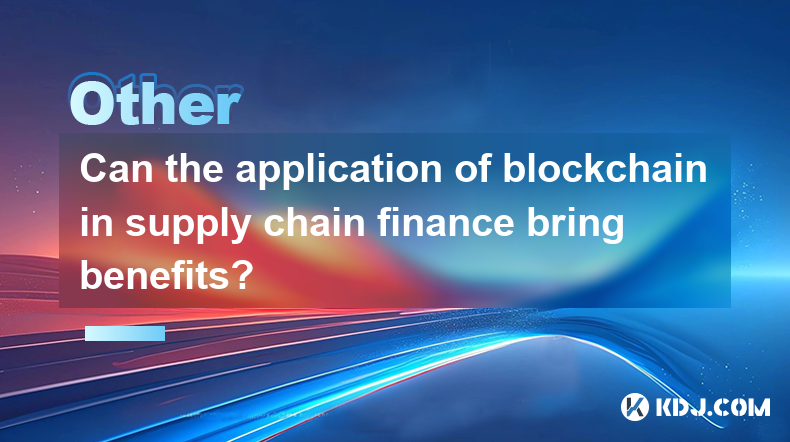
Can the application of blockchain in supply chain finance bring benefits?
Apr 15,2025 at 04:00pm
Can the application of blockchain in supply chain finance bring benefits? The integration of blockchain technology into supply chain finance has garnered significant attention in the cryptocurrency and financial sectors. This article explores how blockchain can potentially revolutionize supply chain finance, detailing its benefits and providing a compre...

Does the ranking of Chinese blockchain apps include cross-chain applications?
Apr 14,2025 at 04:00pm
The ranking of Chinese blockchain apps is a comprehensive evaluation that takes into account various aspects such as user base, transaction volume, and technological innovation. A pertinent question arises regarding whether these rankings include cross-chain applications. Cross-chain applications, which allow different blockchain networks to interact an...
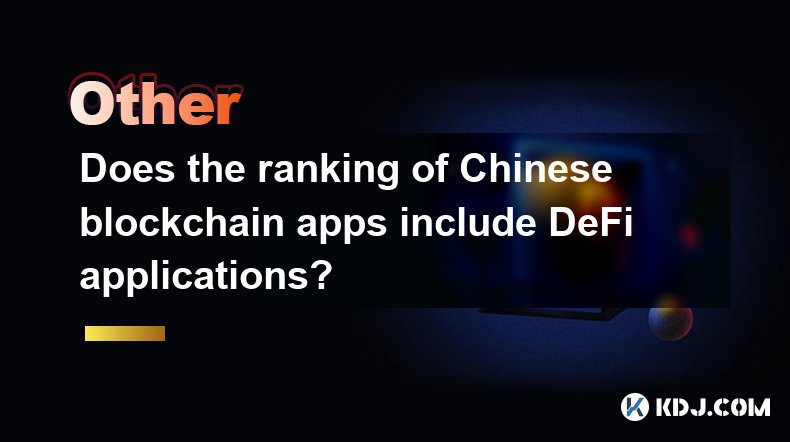
Does the ranking of Chinese blockchain apps include DeFi applications?
Apr 15,2025 at 06:57am
The ranking of Chinese blockchain apps is a comprehensive list that showcases the most popular and influential applications within the cryptocurrency ecosystem. One question that often arises is whether these rankings include DeFi applications. To answer this, we need to delve into the specifics of how these rankings are compiled and what types of appli...
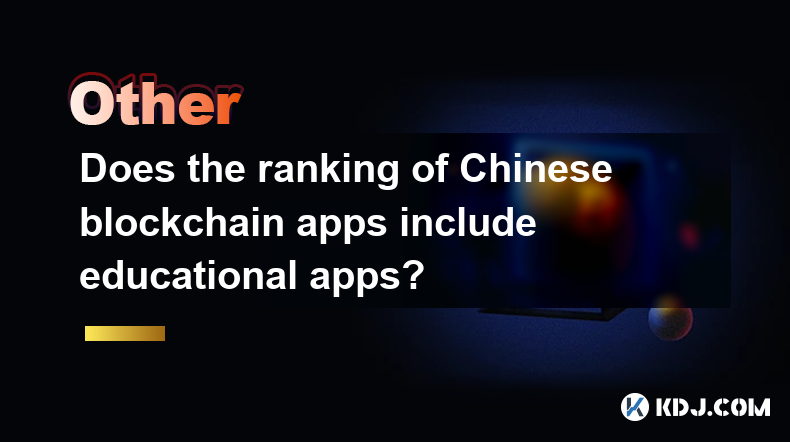
Does the ranking of Chinese blockchain apps include educational apps?
Apr 16,2025 at 03:35am
The ranking of Chinese blockchain apps often includes a variety of categories, from finance and gaming to social networking and beyond. One question that frequently arises is whether these rankings include educational apps. To address this, we need to delve into the specifics of how blockchain apps are categorized and ranked in China, and whether educat...
Does the ranking of Chinese blockchain apps include enterprise-level applications?
Apr 15,2025 at 06:42am
The ranking of Chinese blockchain apps often includes a variety of applications, ranging from consumer-focused to enterprise-level solutions. Understanding the scope and criteria for these rankings is essential to determine if enterprise-level applications are included. This article delves into the specifics of how Chinese blockchain app rankings are co...
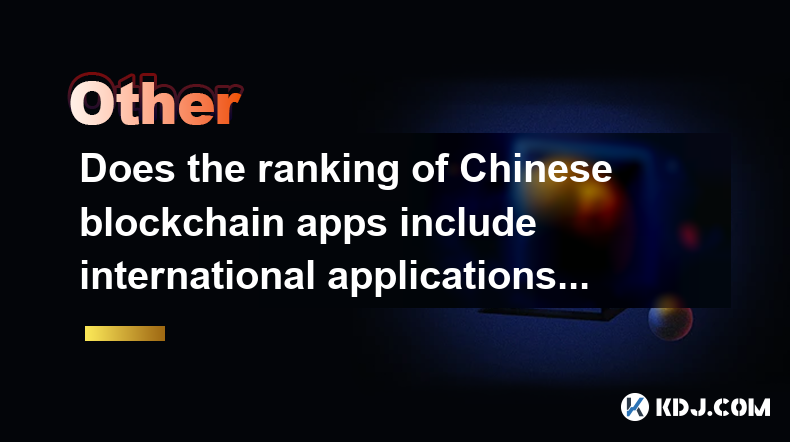
Does the ranking of Chinese blockchain apps include international applications?
Apr 16,2025 at 04:07am
The ranking of Chinese blockchain apps primarily focuses on applications developed and predominantly used within China. However, the question of whether these rankings include international applications is an intriguing one that warrants a detailed exploration. In this article, we will delve into the criteria used for ranking Chinese blockchain apps, th...

Can the application of blockchain in supply chain finance bring benefits?
Apr 15,2025 at 04:00pm
Can the application of blockchain in supply chain finance bring benefits? The integration of blockchain technology into supply chain finance has garnered significant attention in the cryptocurrency and financial sectors. This article explores how blockchain can potentially revolutionize supply chain finance, detailing its benefits and providing a compre...

Does the ranking of Chinese blockchain apps include cross-chain applications?
Apr 14,2025 at 04:00pm
The ranking of Chinese blockchain apps is a comprehensive evaluation that takes into account various aspects such as user base, transaction volume, and technological innovation. A pertinent question arises regarding whether these rankings include cross-chain applications. Cross-chain applications, which allow different blockchain networks to interact an...

Does the ranking of Chinese blockchain apps include DeFi applications?
Apr 15,2025 at 06:57am
The ranking of Chinese blockchain apps is a comprehensive list that showcases the most popular and influential applications within the cryptocurrency ecosystem. One question that often arises is whether these rankings include DeFi applications. To answer this, we need to delve into the specifics of how these rankings are compiled and what types of appli...

Does the ranking of Chinese blockchain apps include educational apps?
Apr 16,2025 at 03:35am
The ranking of Chinese blockchain apps often includes a variety of categories, from finance and gaming to social networking and beyond. One question that frequently arises is whether these rankings include educational apps. To address this, we need to delve into the specifics of how blockchain apps are categorized and ranked in China, and whether educat...

Does the ranking of Chinese blockchain apps include enterprise-level applications?
Apr 15,2025 at 06:42am
The ranking of Chinese blockchain apps often includes a variety of applications, ranging from consumer-focused to enterprise-level solutions. Understanding the scope and criteria for these rankings is essential to determine if enterprise-level applications are included. This article delves into the specifics of how Chinese blockchain app rankings are co...

Does the ranking of Chinese blockchain apps include international applications?
Apr 16,2025 at 04:07am
The ranking of Chinese blockchain apps primarily focuses on applications developed and predominantly used within China. However, the question of whether these rankings include international applications is an intriguing one that warrants a detailed exploration. In this article, we will delve into the criteria used for ranking Chinese blockchain apps, th...
See all articles























































































